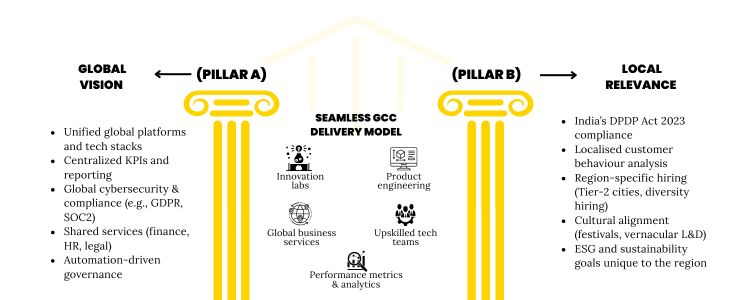
The Global Capability Centre (GCC) is no longer a back office. In 2025, these innovation centers will become strategic drivers of digital accelerators and global enterprises. India, where there are more than 1,900 GCC centers, contributes 50% to the world’s GCC workforce, which supports the technical talent pool of 60 million professionals and has a 35-40% cost profit (NASCOM, 2024) as compared to Western markets. This bounce creates a new challenge: How do you establish a globally integrated GCC operation while being deeply associated with local expectations? As a leading GCC outsourcing and ODC company in India, we allow ourselves to design, build, and manage Global Capability Centres that are globally aligned in governance, technology, and performance, yet deeply responsive to regional regulations, talent ecosystems, and cultural nuances.
ODC Offshore Development Centres, or full-scale GCC organisations, often have the following goals: These objectives are valid and strategic, but alone, they do not guarantee regional success.
India’s local mobility demands optimisation: Ignoring these realities leads to friction, faults, and a decreased number of employees.
This is where success lies: in implementing adaptive strategies that effectively combine global consistency with local flexibility. Strategic Wires That Keep Your GCC Together:
This data indicates that India’s local ecosystem is not just a support system but a growth engine.
India has the future modular integration of GCC operations, ODC setup, and GCC consultation firms:
The most successful GCCs in India—whether in Bangalore, Hyderabad, or Gift City—are those that construct a strong bridge between headquarters intentions and local relevance.
At Inductus GCC, we specialise in helping global enterprises to establish GCCs that are globally integrated and respond locally—with strategy, speed, and compliance.
This means to align global goals with local compliance, talent, and culture for operational success. India is a global GCC center due to cost efficiency, digital readiness, and a huge talent pool. They provide strategy, setup, compliance, appointment, and operation aid for new and existing GCC The GCC will have to amend the localisation and security practices of data governance according to Indian law. Partner with experts such as Inductus GCC for complete plan, implementation, and development. Aditi, with a strong background in forensic science and biotechnology, brings an innovative scientific perspective to her work. Her expertise spans research, analytics, and strategic advisory in consulting and GCC environments. She has published numerous research papers and articles. A versatile writer in both technical and creative domains, Aditi excels at translating complex subjects into compelling insights. Which she aligns seamlessly with consulting, advisory domain, and GCC operations. Her ability to bridge science, business, and storytelling positions her as a strategic thinker who can drive data-informed decision-making.
Global Objective: Efforts for Integration
Local Realities: Market Attraction
Adaptive Strategies To Connect Both
Strategy
Description
Impact on GCC Operations
Binary governance model
Central policies + Local operational autonomy
Compliance with flexibility
Regional Centres of Excellence
Indian GCCs leading GenAI or ESG innovation
Reverse innovation feeds global systems.
Talent Glocalization
Global L&D, local context in delivery
Higher productivity and retention
Modular Tech Stack
Shared base platforms with pluggable local features
Scalability with regional customisation
Culture-Sync Rituals
Global values + Local celebrations, languages
Stronger team bonding and reduced attrition
How the Companies Are Bridging This Difference

Some Data Insights
Flexible Manufacture of Modular GCC
Conclusion
frequently asked questions (FAQs)

Aditi
Hey, like this? Why not share it with a buddy?
Related Posts
Recent Blog / Post
- Pharma GCC Setup Services in India: Strategic Considerations for CXOs January 9, 2026
- Why Enterprises Are Rethinking Their GCC Strategies in 2026 January 8, 2026
- Why Most Enterprise Expansion Strategies Fall Short of Projections, And How a GCC Enabler Can Bridge the Gap January 7, 2026
- India’s GCC Ecosystem: Why the World’s Biggest Companies Are Betting Their Future on it January 3, 2026
- Healthcare GCCs in India: Where the World’s Pharmaceutical Innovation Actually Happens January 2, 2026
- Circular Economy Models and Their Relevance to Manufacturing GCCs December 30, 2025
- GCCs in Agritech: Digitizing Global Food Security December 29, 2025
- Renewable Energy GCCs: Accelerating Global Green-Tech Development December 29, 2025
- Cyber Resilience 2030: Multi-Layer Security Architecture for GCCs December 26, 2025
- Building an Integrated Risk Management Framework for Multi-Region GCCs December 26, 2025
- The Ethics of Automation: How GCCs Maintain Human Oversight in AI Workflows December 25, 2025
- Future of HR in GCCs: Data-Led, Skills-Based, and GenAI-Driven December 25, 2025
- The Proposal to Standardize India’s GCCs for Unshakeable Global Leadership December 24, 2025
- Global Capability Centers: A Strategic Growth Model for B2B Enterprises December 24, 2025
- AI Ethics & Compliance Mandates for GCC Operations in 2025 December 23, 2025
















